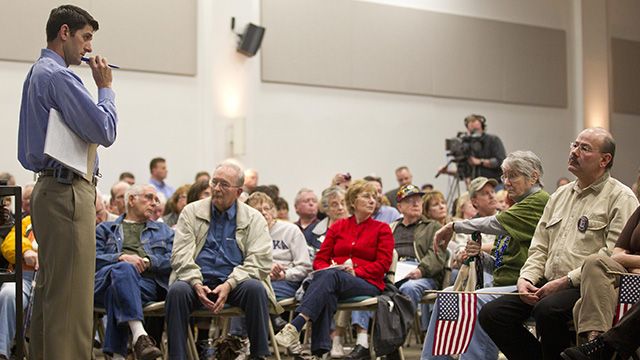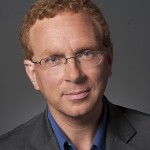This post first appeared at The Nation.

How’s this for irony:
When the City of Kenosha, Wisconsin, was preparing to formally petition Congress to take the necessary actions to get corporate money out of politics and to restore grassroots democracy, the congressman who represents the community was meeting secretly with the Koch brothers to plot election strategies and policy agendas.
Kenosha is the largest city in Wisconsin’s first congressional district, which Congressman Paul Ryan has represented since 1999 — thanks to gerrymandered district lines and heavy infusions of cash from out-of-state special interests. With Congress out of session for the August recess and Ryan expected to head home to meet with constituents, members of the Kenosha City Council decided to deliver a message. They voted overwhelmingly to ask Ryan and other Wisconsin representatives “to amend the Constitution to bar corporate wealth from unduly influencing elections.”
That’s not a particularly radical request.
Sixteen states and roughly 500 communities have petitioned Congress to support a constitutional amendment to restore the power of the people—through their federal, state and local representatives — to place limits on the influence of big money, especially corporate money, in American politics. The official calls from states across the country, and from cities such as Kenosha, come in response to the high court’s decision to remove restrictions on corporate spending to buy elections, which capped a series of rulings that undermined limits on the power of wealthy Americans to dominate the political and governing processes of the nation with unprecedented infusions of campaign money.
Ryan has been among the prime beneficiaries of the money-in-politics moment ushered in by the high court. As the House Budget Committee chairman, he has collected millions of dollars from individuals and groups that stand to benefit from initiatives such as Social Security privatization and the development of voucher schemes to “reform” Medicaid and Medicare. The congressman has become a favorite of many of the biggest donors in the country, including billionaire industrialists Charles and David Koch.
The Koch brothers, prime funders of conservative causes and Republican politicians, were enthusiastic backers of placing Ryan on the 2012 Republican ticket. That move entered in a fiasco that saw Ryan fail to deliver Wisconsin for the ticket led by Mitt Romney. Ryan not only lost his hometown of Janesville but many of the other communities in his district, including Kenosha.
Casual observers might guess that Ryan would be listening a little more to his district, especially to the voters in cities such as Kenosha.
But they would guess wrong.
As Kenosha was petitioning for the redress of money-in-politics grievances, the congressman was at a posh resort near Albuquerque, New Mexico, where he had flown as soon as Congress went on recess. The Koch brothers had rented the entire Hyatt Regency Tamaya Resort and set up a private security perimeter so that no media — and certainly no citizens — could get near the elite retreat. And they invited Paul Ryan to spend several days with them as their guest of honor. Along with House Majority Leader Eric Cantor, American Enterprise Institute president Arthur Brooks and a few other worthies, the Kochs and their wealthy friends wined and dined with Ryan.
A source that spoke to Politico reported that Ryan was “well-received by donors.” According to the Politico report, “Ryan has developed deep ties to Koch World“—the vast network of political operations controlled by the billionaire brothers.
The question is whether the congressman retains deep ties to Kenosha.
In case the congressman missed the message, the Kenosha City Council was joined in mid-August by the Kenosha County Board—the governing body of the populous southeastern Wisconsin county that is entirely within Ryan’s district—in calling for an amendment to overturn Citizens United. And constituents like Jennifer Franco, of Kenosha, are saying its time for their elected representatives to “stand with the people to proclaim that money is not speech, that artificial entities are not persons, and that every person’s voice carries the same weight.”
The juxtaposition of events in New Mexico and Wisconsin leaves Ryan with a clear choice to make: he can either stick with the Koch brothers or he can respond to the call from Kenosha for a meaningful response to the threat posed to democracy by the buying of elections and the policymaking process.


